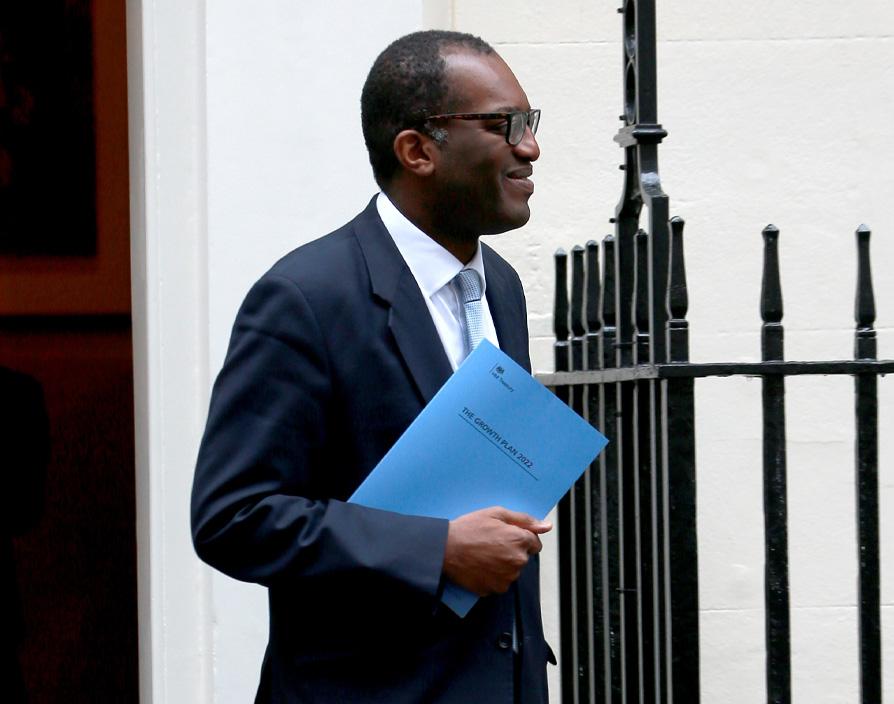Kwasi Kwarteng has delivered his mini-budget providing the “biggest package in generations” in a series of tax cuts to spearhead economic growth. The UK chancellor has announced plans to scrap the highest rate of income tax and the bonus cap for bankers, which largely benefit the richest of society. Corporation tax on big business profit has also been axed.
This comes on top of plans to freeze household energy bills at £2500 for a typical energy-using household. Kwarteng insisted “help is coming” as families across the UK deal with the rising cost of living. In summary, Kwarteng has announced the 45% additional rate income tax band for those earning more than £150,000 will be scrapped entirely. Meanwhile, the 40% higher rate, charged on incomes above £50,271, will remain. The chancellor will bring forward a cut in the basic rate of income tax from 20% to 19% to April 2023.
The 1.25 percentage point national insurance rise, which was introduced earlier this year, will be cancelled from 6 November, Kwarteng confirmed. Stamp duty will also be cut for property buyers in England and Northern Ireland. The chancellor says it is a “permanent cut” effective from today. The chancellor confirmed almost 40 investment zones will be created with tax breaks for businesses. These areas including the Tees Valley, West Midlands, Norfolk and the west of England which are in the running.
The mini-budget comes amid a cost of living crisis, driven by soaring inflation, skyrocketing energy bills as wages are failing to keep up with the increase in prices. Some business leaders praised the chancellor for implementing the new changes, which will inevitably help small businesses grow and succeed amid mass economic uncertainty.
Martin McTague, National Chair of the Federation of Small Businesses (FSB), said: “The Truss Government is off to a flying start. The Chancellor has delivered pro-small business measures today and has rightly recognised that removing taxes on jobs, investment and entrepreneurs is essential for our economy.
“Ministers need to be relentless in removing barriers to small business success – especially with the current headwinds. The Government has today signalled its determination to back small firms and we look forward to working with Ministers and departments to put in place measures to help small businesses grow and succeed.”
Samantha Mansfield, Head of Strategy, Merkle Experience & Commerce, UK said: “Disposable incomes are being heavily squeezed, it’s hard to predict what will happen next. The public is absolutely feeling the uncertainty across the board as energy prices and inflation continue to rise, which is why we’re seeing consumer confidence at its lowest in history. Today’s mini-budget saw the chancellor announce tax cuts for businesses and consumers, which will hopefully provide short-term relief from the ongoing crisis.
However, some business leaders were quick to lash out at the budget, saying it will do “little” to benefit Britain’s workforce, who are bearing the brunt of rising costs of living. Chieu Cao, CEO of Mintago, said: “Many employees are under huge financial strain, and many of the tax cuts announced today will do little to actually boost the take-home pay of lower earners. Employers, therefore, must step up their support, providing everything from financial advice to financial planning tools to help their staff navigate this testing climate. It is not for the Government alone to help people out of this crisis; businesses should embrace their responsibility and question what more they can do.”
Meanwhile, some business leaders urged the government to tackle more pressing issues SMEs are currently facing, including the issue of late payments. Alex von Schirmeister, UK Managing Director, Xero said: “This is a huge budget, but let’s hope it will work in the longer term. Will it reassure small businesses? It’s encouraging to hear the Chancellor draw the link they have to families, but today’s announcements seem better aligned with big businesses and larger SMEs.
“It is crucial that the government also considers how to give small firms what they need to drive growth. In particular, the issue of late payments has become more severe during economic uncertainty – putting smaller firms’ viability at the whim of whether their larger customers can pay them on time.”
Share via:








































